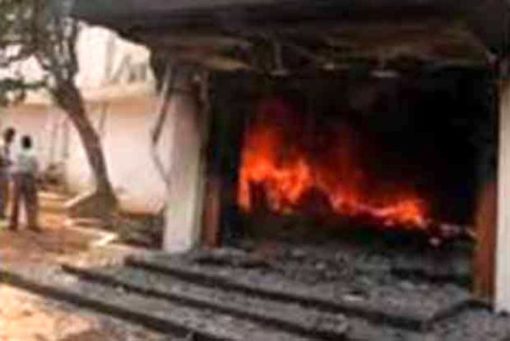“Nothing prevented the Trial Judge to use his own eyes to see the person standing in the dock and the person seen in the photographs/videos.”

The Madras High Court has convicted 9 persons accused of attacking Dinakaran Newspaper office in Madurai in 2007, which had resulted in death of three employees viz. Vinoth Kumar, Gopinath and Muthuramalingam.
The bench comprising Justice PN Prakash and Justice B. Pugalendhi, allowed the appeal filed by the state and sentenced nine persons, including ‘Attack’ Pandi to life imprisonment.
On 9th May 2007, the Madurai office of Dinakaran Newspaper, were set on fire allegedly by the supporters of M.K. Alagiri. 17 persons including V.P. Pandi @ Attack Pandi were tried by the Trial court. Out of 83 prosecution witnesses examined 49 turned hostile. Those 49 included 21 police officers, a Revenue officer and 15 from the press, including the colleagues of the trio who had died. The Trial court finally returned a verdict of acquittal.
Acquittals of V.P. Pandi @ Attack Pandi, Prabhu @ Arogyaprabhu,Vijya Pandi, P.Kandasamy, G.Ramaiah Pandian,, V. Sudhakar, Thirumurugan @ Kattuvasi Murugan, I. Ruban and Malik Batcha have been now set aside by the High Court. The bench also convicted V.Rajaram, the police officer who was accused of giving protection to Attack Pandi and group. The court also imposed vicarious liability on the State of Tamil Nadu and directed it to pay a compensation of Rs.5 lakhs each to the families of the bereaved, within a period of three months.
The judgment authored by Justice Prakash is an interesting read.
Judges Themselves Identified The Accused From Photos
Although there were many photographs covering the incident including the faces of the accused, the Trial Court would not take them into account because no witness came into the witness box and looked at the photographs and identified the persons in the photographs and videos as the accused who were standing in the dock.
The bench faulted this logic adopted by the Trial Judge. Instead of making a witness look at the photograph and identify the person in the dock, nothing prevented the Trial Judge to use his own eyes to see the person standing in the dock and the person seen in the photographs/videos and arrive at a just conclusion, the court said. It gave an illustration:
“A rape victim, while giving evidence, says that she hit the accused with an iron rod on his head in frustration after she was deflowered by him. Is it not open to the Trial Judge to examine the head of the accused to verify if there is any trace of injury? The fact that the Trial Judges, unfortunately, do not exercise this power is another matter. But, that does not mean that the Court is not empowered to look into it.”
“Perhaps, the Trial Judge was labouring under a belief that since the Goddess of Justice is a blind-folded lady with a physical balance in one hand and a sword in the other, he could follow suit and turn a Nelson’s eye to the electronic records that were before him. The trial judge could have very well used his own eyes to correlate the accused present before him with those found in the material object”
The bench itself undertook this exercise. On 8th March 2018, the accused were made to sit facing the judges. The judges did not sit on the dais, but instead between the advocates and facing the LED screen. The main accused, Attack Pandi’s ‘presence’ was ensured through video conferencing.
“We looked at their face and looked at their photo on the screen in order to satisfy ourselves… we ourselves were able to identify three of the accused”, the bench said explaining the process.
Humans Did Not Side With The Truth, Machines Did
The bench also rejected the contention based on unavailability of Section 65-B(4) certificate, observing that it could not be kept out of the Court’s consideration. The bench observed:
“Needless it is to state that procedure is only a handmaid of justice. When humans have, for extraneous reasons, like the case at hand, failed to be on the side of the truth, the evidence collected by machines like cameras, cannot be kept out of judicial scrutiny, on specious reasonings.”
Journalists Turned Hostile
During the trial, some of the photographers and journalsists, had turned hostile. Only Nakkeeran Gopalan and some others had given evidence against the accused.
The bench specifically criticised Muthupandian, News Editor, Dinakaran, who had also turned hostile. In his evidence, he said: “Some persons set fire to our office and the other employees were busy trying to douse it. I was busy working on the evening edition of Tamil Murasu.” The bench quipped: “Literally and allegorically, Muthupandian’s above statement reminds us of the classical quote “Nero fiddled when Rome burned”. Fortunately, Muthupandian and the other colleagues of the deceased did not say that the trio committed suicide by self-immolation in the Dinakaran office and that is why the office went ablaze.”
Courtesy: Indian Cultural Forum